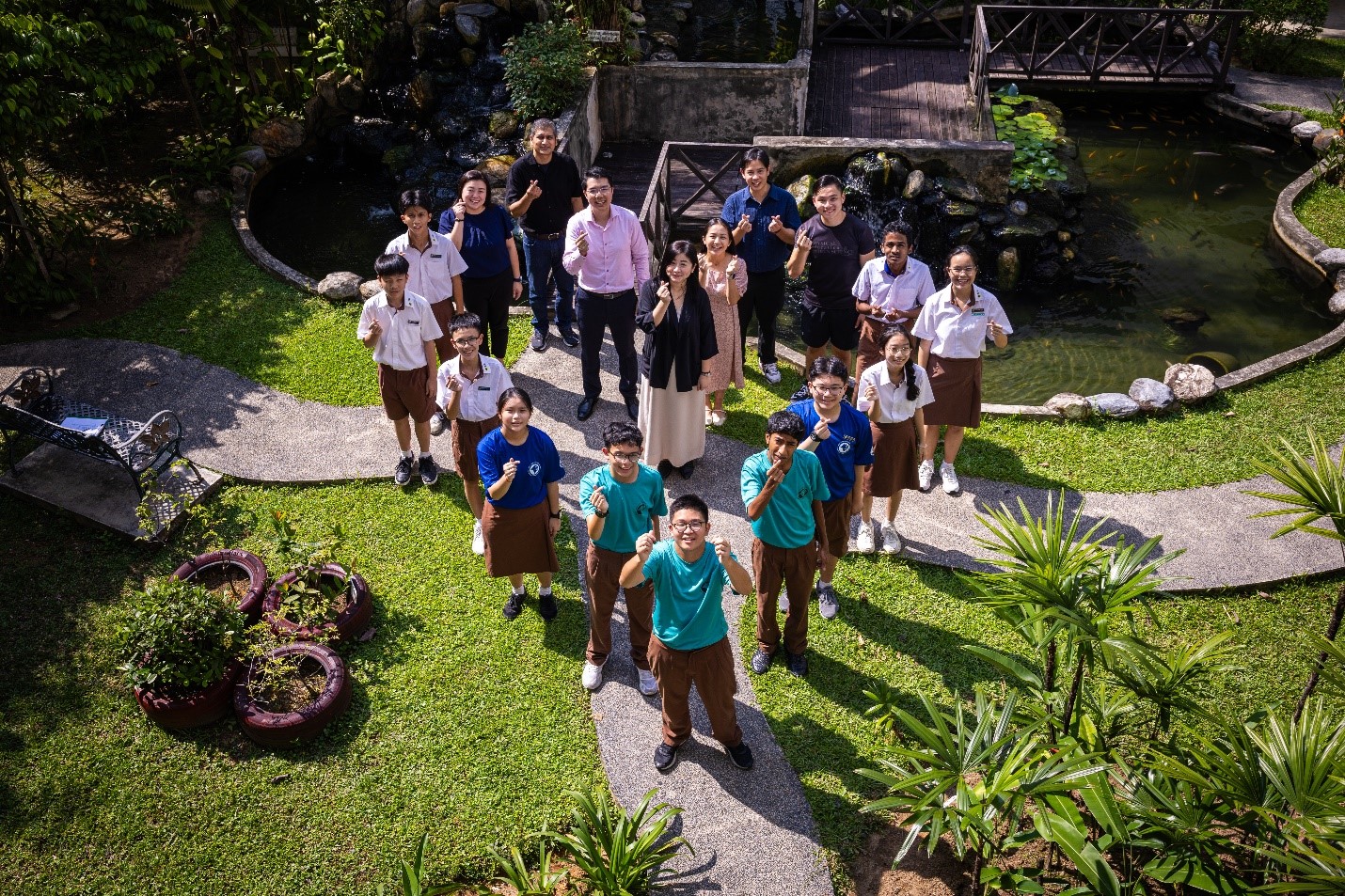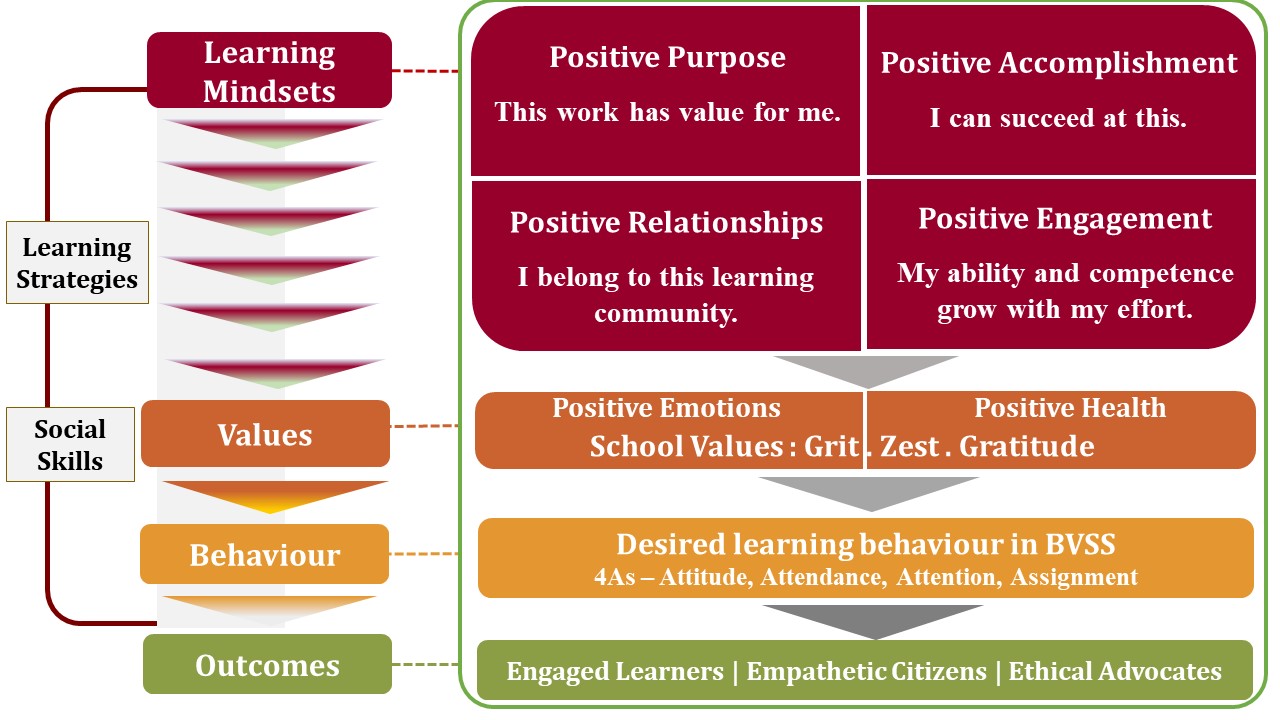Positive Education
Positive Education

In line with the school’s vision to develop Engaged Learners, Empathetic Citizens and Ethical Advocates, BVSS adopts Positive Education as a whole-school approach to increase students’ capacity to learn effectively, enhance resilience and develop a learning community where students flourish and lead meaningful lives.
Positive Education brings together the science of positive psychology and best practices in teaching and learning to support students to thrive in their learning environment. The primary aim of Positive Education is to enhance students’ well-being and instill in them a greater sense of purpose. When students feel good, they experience healthy levels of optimism, emotional stability and resilience. When they do good, they learn to nurture positive relationships, care for others and use their skills and knowledge to contribute meaningfully to society.
In BVSS, we want our students to thrive. Developing an understanding of one’s character strengths and utilising them in a variety of different ways builds confidence and competence in our students.
We help students to flourish through these six domains:
-
Positive Relationships – We believe in helping our students to develop social and emotional skills that strengthen their positive relationships with their peers and teachers, and emphasise the importance of connectedness and strong relationships for their well-being.
-
Positive Emotions – Through a culture of care in the school, we seek to engender positive emotions of well-being such as gratitude, hope and joy. We believe this will build up students’ resilience and character strengths.
-
Positive Health – We provide opportunities for students to develop sustainable habits for optimal physical and psychological health.
-
Positive Engagement – We provide meaningful learning experiences for students across subjects and through the Applied Learning Programme and Learning for Life Programme, so that they can experience complete immersion in activities through understanding the nature of engagement, the pathways to it and the impact it has on individual wellbeing.
-
Positive Accomplishment – We provide opportunities for students to pursue their passions and deepen their mastery in various disciplines to achieve meaningful outcomes. We provide support for students to embrace challenges with grit, hope and a willingness to learn from their experiences.
-
Positive Purpose – We believe that students extract meaning by connecting their strengths and skills that they have developed and making a positive difference to others, contributing to the greater good by engaging in activities for the benefit of the community.
Learning Mindsets

Our Positive Education approach is further enhanced by the learning mindsets we hope our students will adopt.
Learning mindsets are beliefs and attitudes students need to possess to enhance their motivation, engagement and achievement. Positive learning mindsets allow students to be more engaged in their learning, demonstrate a keen attitude and persist despite setbacks which will lead to positive accomplishments.
We help students to thrive through these four learning mindsets:
-
I belong to this learning community – When students feel a sense of connectedness with their learning community, they will strive to be more competent and have higher levels of intrinsic motivation. They have a strong sense of identity and are willing to put in more effort in their learning.
-
My ability and competence grow with my effort – Students with a Growth Mindset believe that they can increase their capacity by their own effort and demonstrate grit to work towards building competence. They embrace challenges, persist in the face of setbacks and see effort as the path to mastery. They learn from feedback and find lessons and inspiration in the success of others.
-
I can succeed at this – When students believe that success is possible and within their control, they tend to feel more confident in their ability to complete assigned tasks. They are likely to succeed in meeting academic demands in the classroom, willing to try hard and experience zest in completing tasks, even if they find the work challenging or do not experience immediate success.
-
This work has value for me – Students are naturally motivated to learn when they perceive a task to be interesting and relevant. When students are more interested in a subject or see a connection between the academic tasks and their own future goals, they are more likely to expand persistent effort and exhibit academic behaviours that support success in their learning.

Mapping the four Learning Mindsets to our Positive Education approach

